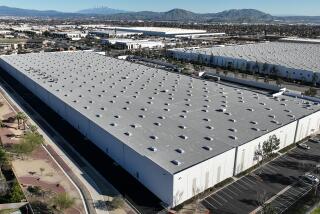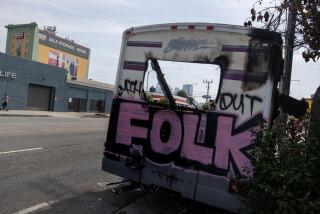Council OKs Rush-Hour Ban on Most Large Trucks
The City Council on Tuesday approved Mayor Tom Bradley’s plan to cut traffic congestion and air pollution by banning 70% of large trucks from city streets during rush hours.
The ban, the first in the nation, is expected to be used by the South Coast Air Quality Management District as a model for other communities in Southern California.
Although the ban will not apply to freeways, it is expected to reduce by 50% the number of large trucks traveling on the freeways during rush hours because they will not be permitted to use city streets to enter or exit.
In a written statement Tuesday, Bradley, who is in Europe, said he was “delighted” by passage of the proposal and said it moves Los Angeles a step closer to being the first city in the country to manage truck traffic.
Bill Bicker, Bradley’s transportation adviser, said Tuesday it will be at least three months before the plan takes effect. “Trucking is crucial to the economy,” Bicker said, “but unless we manage heavy-duty truck traffic, trucks and commuters will find themselves increasingly mired in congestion.” He said the plan balances the goals of managing growth and ensuring the economic well-being of the city.
“Not to do this is not to change the status quo,” said Councilman Zev Yaroslavsky. “And the status quo stinks.”
Proposed by Bradley more than a year ago, the measure had been held up for months in the council’s Transportation Committee as trucking interests lobbied heavily against it. Under increasing pressure from Bradley’s office as well as other council members, Councilman Nate Holden, chairman of the committee, sent the proposal to the council late last week.
But the proposal emerged from committee with a number of exemptions for special interests, including small construction firms and trucks carrying seasonal items such as Christmas trees and watermelons.
Bicker said Tuesday an attempt will be made to remove the exemptions before the final ordinance is drawn up.
“What we tried to do consistently was never grant exemptions for an industry,” Bicker said, “but set up rules that would provide across-the-board regulations for industries of all types.”
Bicker said it was “overwhelmingly the intent of the council to have a broad-based plan with no special-interest exemptions,” but added, “I think they were unaware of the fact that they exempted people who didn’t need to be exempted.”
One exemption, for the grocery industry, was left in Tuesday even though the Southern California Grocers Assn. said it did not want any special treatment.
“We recognize along with elected officials that you can’t single out groups for exemptions,” said Steven Koff, president of the association. “We want to have to bite the bullet with everyone else.” He said the association supported Bradley’s position that an appeals situation for hardship cases would be adequate.
The council approved the broad outlines of the plan in a unanimous vote Tuesday, but it will be at least three months before the city attorney’s office and the city Department of Transportation work out the specifics.
Estimates of the number of heavy-duty trucks that regularly use Los Angeles streets run from 100,000 to 500,000. Officials say they have not determined how many trucks may need to get special permits.
The measure will apply to trucks weighing 26,000 pounds or more, generally tractor-trailer rigs and other trucks with three or more axles. Fleet owners will be permitted to operate only 30% of their trucks during any “peak period,” defined as 6 to 9 a.m. and 4 to 7 p.m. Monday through Friday.
Further, they may operate the trucks during peak periods only if the trucks are inspected and meet safety standards. At present large numbers of trucks in California are unsafe and have not been inspected in years, the mayor’s office said.
Exempted trucks will be required to display a placard supplied by the city when they are operating during peak periods. Any truck spotted without a placard will be sent a ticket by mail so as not to delay traffic by stopping it on the street.
The penalty for operating during peak hours without permission has not yet been worked out, but the city plans to charge $60 per year per vehicle to pay the costs of the program.
Whether the city will be able to collect the fee is in doubt, however, because of a bill passed in the closing hours of the legislative session in Sacramento in September. That law appears to bar the city from collecting the fee, so the city may enlist the South Coast Air Quality Management District to collect the fee instead.
Another issue that remains to be resolved is how to deal with violations of the city’s noise ordinance that may occur if truckers are forced to make deliveries late at night or early in the morning.
Thomas C. Schumacher, head of the California Truckers Assn., said Tuesday that the council action was “a far cry from the passage of a truck ban,” and that he would not comment on the matter “until I see something in writing.”
Regarding the exemptions written into the plan, several council members indicated Tuesday they will seek to have them removed.
“Otherwise, the exemptions are open to whoever screams the loudest,” said Councilwoman Gloria Molina.
The special-interest exemptions were inserted by Holden during committee hearings after individuals and special-interest groups complained that their businesses would be hurt.
HIGHLIGHTS OF THE TRUCK MANAGEMENT PLAN
Heavy-duty trucks, those weighing 26,000 pounds or more, will not be permitted on city streets from 6 to 9 a.m. and 4 to 7 p.m. weekdays unless they have special permission from the city.
Fleet operators may obtain permission to operate up to 30% of their trucks during peak periods if their fleets meet safety requirements.
A fee of as much as $60 a truck will be charged.
An appeals board will be set up to deal with hardship cases.
Residents who experience noise or other problems related to late-night or early morning deliveries may file a complaint with the appeals board.
Certain trucks may be exempt from the ban, including produce and grocery trucks, owners of small fleets of trucks, trucks carrying seasonal deliveries, utility repair trucks and trucks hauling hazardous materials. Liquor trucks, already regulated by state law, may also be exempt.
A rapid deployment force consisting of helicopters and heavy-duty tow trucks would be stationed throughout the city to quickly clear trucks involved in accidents from major arteries.
More to Read
Sign up for Essential California
The most important California stories and recommendations in your inbox every morning.
You may occasionally receive promotional content from the Los Angeles Times.









